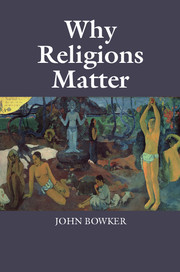Book contents
3 - Religions and sciences
I Myth and meaning: ‘The warfare between science and religion’
Published online by Cambridge University Press: 05 April 2015
Summary
In that same year, 1870, in which Huxley published his Lay Sermons, Ruskin published his Oxford lectures, Lectures on Art, in which he wrote (IV, §125): “A Spirit does actually exist which teaches the ant her path, the bird her building, and men, in an instinctive and marvellous way, whatever lovely arts and noble deeds are possible to them.” Richard Dawkins (one of those who sees himself engaged in a war against religion) exhibits a similar ambition, to find a comprehensive cause of animal behaviour and human culture, but he would reject ‘a Spirit’ as that cause, just as firmly as his predecessors rejected Bergson’s élan vital.
There is, however, one point of agreement between Ruskin and Dawkins. Ruskin came to a comparable dislike of institutional religion and religious Orders: in The Seven Lamps of Architecture he wrote of Roman Catholicism that “its lying and idolatrous Power is the darkest plague that ever held commission to hurt the Earth”, and he denounced ‘the Pride of Faith’ which, in his view, destroys humanity. It is true that Ruskin retained his ‘Religion of Humanity’, but during his famous visit to Turin in 1858 (see note 3), he wrote in a letter to C.E.Norton (October 24, 1858) that “to be a first-rate painter – you mustn’t be pious, but rather a little wicked and entirely a man of the world.” He meant by that spending £100 “in grapes, partridges and the opera.”
Information
- Type
- Chapter
- Information
- Why Religions Matter , pp. 45 - 64Publisher: Cambridge University PressPrint publication year: 2015
